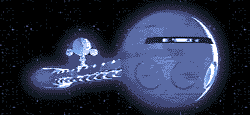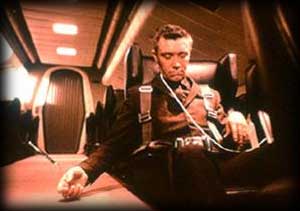
TO CRACK THIS RIDDLE, one needs to understand an elementary principle about human psychology: A person's wants and desires influence more than his behavior. They influence his thinking, as well, and even his powers of perception. This is true even with regard to things that would be otherwise intuitively obvious. Psychologists say that when a person is confronted by ideas or facts that are at odds with his pre-existing notions, what results is "cognitive dissonance," a sort of static in the human psyche. This "static" has the power to distort or even block perception.
An extreme example of this is described by psychiatrist Rollo May in his bestselling book, Love and Will: "A patient of mine presented data the very first session, that his mother tried to abort him before he was born, that she then gave him over to an old-maid aunt to raise him for the first two years of his life, after which she left him in an orphan's home, promising to visit him every Sunday, but rarely putting in an appearance. Now, if I were to say to him -- being naive enough to think that it would do some good -- 'Your mother hated you,' he would hear the words but they might well have no meaning whatever for him. Sometimes a vivid and impressive thing happens. Such a patient cannot even hear the word, such as 'hate,' even though the therapist repeats it... The patient cannot permit himself to perceive the trauma, until he is ready to take a stand toward it."
When disturbing information creates "cognitive dissonance," the "static" discredits the information, so that a person does not feel.tkpelled to cope with it, even if it is true. If a fact or idea is sufficiently contrary to his or her "status quo," the threatening data can be prevented from entering their consciousness at all! In effect, "cognitive dissonance" is a tremendously powerful "self-preservation" mechanism which can completely override the human desire for truth.
a certain idea that
can create very intense
"cognitive dissonance,"
even in people who are
very well-adjusted
and highly intelligent.
In "2001" there is a certain idea that can create very intense "cognitive dissonance," even in people who are very well-adjusted and highly intelligent. That is, what the film says about the discovery of the monolithic slab can actually be said of the film itself:
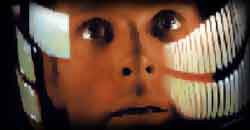
There is something in "2001" that can cause widespread shock and social disorientation.
What, in fact, is it about "2001" that can jolt a person so powerfully?
Man is an intelligent, expressive and creative force in the universe.
if there were indications that, really, his entire existence is an expression of a higher intelligence, he would be greatly shaken.
Man is an intelligent, expressive and creative force in the universe. He realizes this, and is proud of it. This being the case, if there were indications that, really, his entire existence is an expression of a higher intelligence, he would be greatly shaken. Such a notion would be "belittling" to him. Moreover, if this notion is correct, it would require him to make major adjustments in terms of how he views himself and the world around him. Accordingly, such indications would be very threatening, and would trigger great amounts of dissonance in him.
From popular literature we can gain a feeling for just how much trauma might be involved. In Kurt Vonnegut's Breakfast of Champions, the author decides to "go down" into the pages of his book, in order to meet his favorite character. At this point in the book, the favorite character is sitting at a bar, calmly nursing a drink. Suddenly he is ove.tke by a tremendous feeling of anxiety and apprehension. He senses that something is about to enter the room -- something not only awesome, but also something that he "cannot possibly face." That something is the author -- Vonnegut.
Imagine the scene. There sits the favorite character, content with the idea that he is, in fact, a real human being. To say the least, his encountering his creator would occasion a profound crisis in identity. Finding out that he is nothing more than a character in a story would force him to make major adjustments in his way of thinking. Can you appreciate the potential for trauma here?
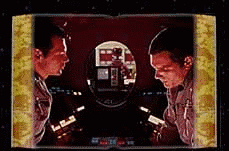
AN INDIVIDUAL IN THE "REAL WORLD" STRUGGLES WITH THE
DISCOVERY THAT
HE IS ONLY A CHARACTER IN A BOOK.
Due to "cognitive dissonance," if a person is asked if a certain idea is true, and his response is, "I don't know," it may not be the case that "sufficient evidence" is lacking. His "I don't know" may be of the "cognitive dissonance" variety. In sum, his doubt can be categorized as being of two possible types:
the logical
"I don't know,"
is based on
logic and reason.
Type
I,
the logical "I don't know," is based on logic and reason.
For example, before probes landed on Mars and sent back reports,
if a scientist had been asked if Mars had life on it, he would have
answered simply, "I don't know." The basis for his answer was
purely rational. He lacked information. Before the probes
scientists had no conclusive proof about whether there was life on
Mars. Possibly there was life there, but how could anyone know?
the emotional
"I don't know,"
is completely divorced
from logic and
reason.
doubt springs
from a powerful
and
subconscious
"I can't take it."
the emotional "I don't know," is completely divorced from logic and reason. Doubt here is not based on a lack of evidence or a shortage of information. On the contrary, the evidence here is .tkpelling, but doubt springs from a powerful and subconscious "I can't take it." Examples of this type abound, especially in the history of science [see Menu] where sufficient evidence existed to support new, revolutionary discoveries, but scientists could not accept the evidence, and remained skeptical, for the new findings flew in the face of their views. "Cognitive dissonance," the phenomenon that creates this type of doubt, can provoke bizarre thinking even in those who are noted for logic and reason.
"2001 -- A Space Odyssey" contains
a
subtle message about
probably the most
important "I don't know"
that issues forth from
the
lips of man.
Man asks,
"Is there a
God?"
The film "2001 -- A Space Odyssey" contains a subtle message about probably the most important "I don't know" that issues forth from the lips of man. Man asks, "Is there a God?"
|
On this crucial question, if a person replies, "I don't know," is it Type I or Type II? Is it because there is simply not enough evidence to prove that God exists? Or is it because what ordinarily would qualify as conclusive proof is available, but for certain reasons (e.g. The "Vonnegut Problem"), one cannot accept it? This question touches on the subject of religion, but only peripherally. Really, we are asking here about the human psyche: What goes on in the human mind when a person grapples with the issue of God?
Let us simplify the question by narrowing it down a bit. The best-known argument for the existence of God is the classical "clock in the desert" argument, also known as the "Argument From Design." We know that this argument is not regarded as being convincing. The question, though, is why not?
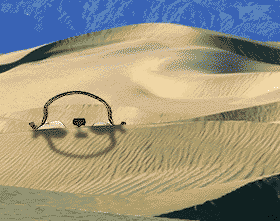
from design really DOES
provide sufficient
evidence for God,
and people reject it,
or remain in doubt
about it, only because
of "cognitive dissonance
When an agnostic hears this argument eloquently expressed, with the most astounding examples of nature's grand designs, he usually admits that the level of design in nature is impressive -- yet he remains skeptical. The prevailing opinion is that his doubt is a Type I doubt -- doubt which is due to insufficient evidence. Is this really the case? Perhaps the argument from design really DOES provide sufficient evidence for God, and people reject it, or remain in doubt about it, only because of "cognitive dissonance," and the widespread doubt here is really a Type II -- due partly to the difficulty that a person experiences adjusting to the idea that he is an expression of a higher intelligence.
